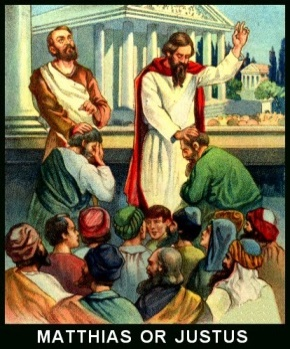First Reading: Acts 1:15-17,20-26
Responsorial Psalm: Ps. 112(113):1-8
Gospel Reading: John 15:9-17
____________________________________
At the core of the field of Economics is the idea that our world is a place plagued with scarcity — that is, we do not have all the resources we want. As a result, we must make choices. Choice refers to the ability of a consumer or producer to decide which goods, services or resources to purchase or provide from a range of possible options; and in making choices, there is always an ‘alternative forgone’ (alternative cost) which is usually called “Opportunity cost,” – known as that thing that must be given up in order to acquire or achieve something else. Thus, being free to choose is regarded as a fundamental indicator of economic well being and development. What does this idea have to do with today’s liturgical celebration in which we celebrate the Feast of St. Mathias?
At the heart of today’s readings is the reality of the choice made by the Lord. To begin with, the first reading presents to us the episode of the selection and call of Matthias from the group of the Disciples of Christ to become an Apostle. The term “Apostle” is derived from Classical Greek “apóstolos” (ἀπόστολος), meaning “one who is sent off”, from στέλλειν (“stellein”), “to send” + από (apó), “off, away from”. In the Biblical context, it means “one who’s sent on a mission.” In Mark 3:13, from his followers (disciples), Jesus selected the 12 Apostles; and the reason was given in verse 14: “that they might be with him and that he might send them out to preach”. An apostle is given the authority of the One who sent him, that is why in Matthew 28:16-20, we read about the great commissioning of the Apostles to go out and win souls – Jesus said: “All authority in heaven and on earth has been given to me. Therefore go and make disciples of all nations…” Therefore, the Apostles were the selected few by Christ Himself who sent them for a mission. Their number (12) was significant, as it tallies with the number of the twelve tribes of Israel. Unfortunately, with the death of Judas Iscariot, the team of the Apostles became incomplete, and as a result, two candidates (Joseph, known as Barsabbas whose surname was Justus, and Matthias) were selected from the group of the disciples, and after some moments of prayers, the Lord chose Matthias through the lots that were drawn.
Dear friends in Christ, the Lord’s choice of his followers takes priority over their choice of him. In today’s gospel reading, we hear Jesus saying to us ‘I chose you’. The Lord’s choice of us is prior to all else, and our choice Him is always in response to His choice of us. Put differently, the Lord is always seeking us out, and our seeking of him is a response to his seeking us. Today’s Gospel makes us understand that the Lord loves us first before choosing us; thus, our love of him should be in response to his love of us.
Unfortunately, after being chosen by the Lord in baptism to follow him as his friend, we end up not choosing the Lord to be our friend by living a life contrary to our Christian calling, making the Lord ‘our opportunity cost’ (alternative forgone), so sad! However, St. Matthias whose feast day we celebrate today should serve as a model for us. He was chosen by the Lord to be an Apostle; and through his total self-giving to the service of God and the people, today, we venerate him as a saint of the Church. Matthias means “Gift of God.” He lived out his name by being a gift to the people of God even to shedding his blood for the sake of Christ. How many religious leaders today (who claim they have been called and chosen by Christ) can sincerely follow the path of St. Matthias, who demonstrated his friendship and love for Christ by being a gift to the Apostles and the Church? It is not only about making people see that we have been called and chosen by God but by reciprocating Christ’s love and friendship towards the flock we lead.
Regrettably, we live in a world where many religious leaders choose themselves in the ministry and the result (fruits) is what we see – aberrations and deviations from the Gospel to manmade ideas, thus, leading their gullible followers astray and making God the ‘alternative forgone’ (opportunity cost). We need more of St. Matthias in our Church today and among “Christian (ecclesial) communities. May religious leaders demonstrate their choice of the Lord as a response to the Lord’s choice of them, and demonstrate this love selflessly even if it entails giving up their lives for their followers.
Dear friends in Christ, to demonstrate God’s choice of us, today’s Psalmist exclaims: “From the dust, he lifts up the lowly, from the dungheap he raises the poor, to set him in the company of princes, yes, with the princes of his people. Therefore, in all our dealings with the Lord, let us remember that the Lord has already chosen us as his friends ‘even before the world was created’ (Eph. 1:4); thus, our way of life should correspond to our calling and demonstrate strongly that we also have chosen our Lord as our friends in response to his choice of us. Remember, as stated at the beginning of this reflection: “being free to choose is regarded as a fundamental indicator of economic well being and development;” likewise, being free to choose our Lord in response to his choice of us is also a fundamental indicator of our spiritual well being and salvation.
Shalom!
© Fr. Chinaka Justin Mbaeri, OSJ
Paroquia Nossa Senhora de Fatima, Vila Sabrina, São Paulo, Brazil
nozickcjoe@gmail.com / fadacjay@gmail.com


